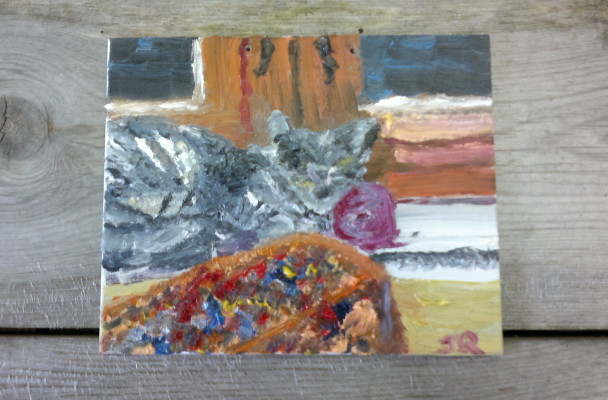Buddhism and Agriculture

Dexter, oil on board
Masanobu Fukuoka has made a big impact on me and it’s fun to say his name to people especially if you use the Japanese reverential form which uses the family name followed by “san”; sounds like one of Del-boy’s lines.
Long before Fukuoka san made an impact on me, he made a huge impact on the world of agriculture in the East with his “do nothing” and “do less” farming methods. Through this approach he was able to grow rice and wheat very successfully using methods that had long since been replaced with reliance on pesticides and pesticide resistant seed that could only be sourced through huge global Agrochemical Conglomerates (mostly beginning with M!).
Trent Brown has written a 2 part study of Fukuoka san on his blog “in between” here are a couple of extracts:
“Fukuoka was uninterested in doctrinal religion. Instead, he took nature as the inspiration for his spirituality, philosophy and practice. Nonetheless, one of the most striking features of Fukuoka’s texts is the manner in which they incorporate many Buddhist elements, particularly those derived from the Taoist-inspired Zen school. With this Zen Buddhist influence, Fukuoka beautifully articulates natural farming as a form of spiritual practice that ultimately overcomes the sense of alienation, dissatisfaction and disenchantment that are characteristic of modern life.”
**********
“According to his account in One Straw Revolution (Fukuoka, 1978/2009), Fukuoka’s journey to natural farming began with a philosophical realisation. After working as a successful agricultural researcher for several years, he found himself one morning struck by the realisation that all human knowledge is empty, all human action is meaningless and that nothingness is the fundamental nature of reality. With this basic existential insight, he began to approach life’s problems with a fundamentally different attitude. He would resist the futile human urge to impose being onto nothingness and structure onto formlessness. Rather than attempting to solve ‘problems’ through actions – new interventions to ‘fix’ things – he began to adopt a more ‘subtractive’ approach. Instead of action, he would experiment with inaction. His philosophy of farming is based around this negative, somewhat Taoist disposition. Rather than solve the problems of agriculture by adding work, he would attempt to do less.”
Part 1 of Trent’s piece in full here.
There is a link to The One Straw Revolution in the Reading section.
Image: permaculture.com

Leave a Reply